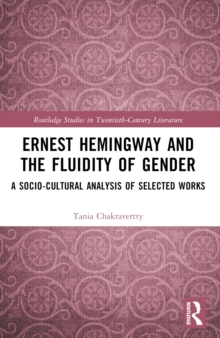
Clemence Dane : Forgotten Feminist Writer of the Inter-War Years EPUB
by Louise McDonald
Part of the Routledge Studies in Twentieth-Century Literature series
EPUB
Description
This feminist investigation of the works of Clemence Dane joins the growing body of research into the relationship of female-authored texts to the ideology and cultural hegemony of the Edwardian and inter-war period. An amalgam of single-author study and thematic period analysis, through sustained cultural engagement, this book explores Dane's journalism, drama and fiction to interrogate a range of issues: inter-war women's writing, the Middlebrow, feminism, (homo) sexuality, liberal politics, domesticity, and concepts of the spinster. It examines form and a range of fictional genres: drama, bildungsroman, detective fiction, historical saga and gothic fiction. It relates back to the genre writing of comparable authors. These include Rosamond Lehmann, Vita Sackville-West, Ivy Compton-Burnett, Dorothy Strachey, Dodie Smith, Rachel Ferguson, May Sinclair, Sylvia Townsend Warner, Daphne Du Maurier, G.B.Stern, and detective writers: Dorothy L. Sayers, Agatha Christie, Gladys Mitchell, Marjorie Allingham and Ngaio Marsh. Offering a picture of an era, focalised through Dane and contextualised through her journalism and the work of her female peers, it argues that Dane is often markedly more radically feminist than these contemporaries. She engages with broad issues of social justice irrespective of gender and her humanity is demonstrated through her sympathetic representations of marginalised characters of both sexes. However, she most specifically evidences a gender politics consistent with the fragmented and multifarious essentialist feminism that emerged following the Great War, which esteemed 'womanly' qualities of care and mothering but simultaneously valued female autonomy, single status and professionalism. Adopting the critical paradigms of domestic modernism and women's liminality, the book will particularly focus on the trajectories of Dane's extraordinary modern heroines, who possess qualities of altruism, candour, integrity, imagination, intuition, resilience and rebelliousness. Over the course of her work, these fictional women increasingly challenge oppressive normative forms of domesticity, traversing physical thresholds to create alternative domesticities in self-defining living and working spaces.
Information
-
Download - Immediately Available
- Format:EPUB
- Pages:276 pages
- Publisher:Taylor & Francis
- Publication Date:31/08/2020
- Category:
- ISBN:9781000206074
Other Formats
- PDF from £35.09
- Hardback from £135.00
- Paperback / softback from £39.35
Information
-
Download - Immediately Available
- Format:EPUB
- Pages:276 pages
- Publisher:Taylor & Francis
- Publication Date:31/08/2020
- Category:
- ISBN:9781000206074










